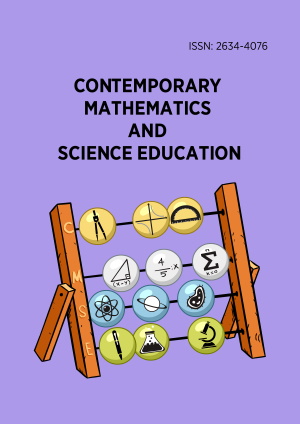Research Article
The effect of realistic mathematics education on the problem-solving competency of high school students through learning calculus topics
More Detail
1 Hong Duc University, Thanh Hoa, VIETNAM* Corresponding Author
Contemporary Mathematics and Science Education, 4(1), January 2023, ep23013, https://doi.org/10.30935/conmaths/13041
Published: 07 March 2023
OPEN ACCESS 4427 Views 3718 Downloads
ABSTRACT
Fostering and developing students’ problem-solving competency is one of the main goals of most mathematics education in the world. Problem-solving competency has been used by the Program for International Student Assessment (PISA) to assess students at the age of 15 since PISA 2003. In Vietnam, new research directions to improve problem-solving competency for students through teaching analytic topics is quite small and not systematic. The purpose of the article is to propose a process of teaching calculus topics in high schools based on the realistic mathematics education approach and problem-solving process according to PISA framework 2021 (OECD, 2018). This design is to support teachers in improving problem-solving competency for students, meeting the requirements of the 2018 general education curriculum in Vietnam today.
CITATION (APA)
Da, N. T. (2023). The effect of realistic mathematics education on the problem-solving competency of high school students through learning calculus topics. Contemporary Mathematics and Science Education, 4(1), ep23013. https://doi.org/10.30935/conmaths/13041
REFERENCES
- Ball, D. L., Ferrini-Mundy, J., Kilpatrick, J., Milgram, R. J., Schmid, W., & Schaar, R. (2005). Reaching for common ground in K-12 mathematics education. Notices of the American Mathematical Society, 52(9), 1055-1058.
- Beigie, D. (2008). Integrating content to create problem-solving opportunities. Mathematics Teaching in the Middle School, 13(6), 352-360. https://doi.org/10.5951/MTMS.13.6.0352
- Berresford, G. C., & Rockett, A. M. (2014). Applied Calculus (7th Edn.). Cengage Learning.
- Da, N. T. (2022). Designing a teaching model based on the realistic mathematics education (RME) approach and its application in teaching calculus. Journal of Mathematics and Science Teacher, 2(1), em006. https://doi.org/10.29333/mathsciteacher/11918
- Davis, R. B. (1992). Understanding “understanding”. Journal of Mathematical Behavior, 11, 225-241.
- Fauzan dan Yerizon, A. (2013). Pengaruh pendekatan RME dan kemandirian belajar terhadap kemamampuan matematis siswa [The effect of the RME approach and learning independence on students’ mathematical abilities]. In Proceedings of Semirata FMIPA (pp. 7-14).
- Freudenthal, H. (1991). Revisiting mathematics education: China lectures. Kluwer Academic Publisher.
- Hac, P. M. (2001). [Research on people and human resources]. National Politics Publishing House.
- Khanh, N. C. (2015). Textbook of assessment in education. Pedagogical University Publishing House.
- Ministry of Education and Training. (2006). General education program at high school level. Education Publishing House.
- Ministry of Education and Training. (2010). Advanced algebra 10: Teacher’s book. Vietnam Education Publishing House.
- Ministry of Education and Training. (2018). General education program of mathematics (issued together with Circular No. 32/2018/TT).
- Nhat, L. T. (1996). [Developing math problem solving ability for high school students through analyzing and correcting mistakes of students when solving math problems] [PhD thesis, Vinh Pedagogical University].
- OCED. (2018). PISA 2021 mathematics framework. OECD Publishing.
- Phe, H. (2002). Vietnamese dictionary. Da Nang Publishing House.
- Phuong, H. T. M. (2021). Đo năng lực giải quyết vấn đề về phương trình bậc nhất của học sinh trung học phổ thông [Measuring the problem-solving ability of first-degree equations of high school students]. Science Journal-Hue University, 130(6B), 107-122.
- Seifi, M., Haghverdi, M., & Azismohamadi, F. (2012). Recognition of students’ difficulties in solving mathematical word problems from the viewpoint of teachers. Journal of Basic and Applied Scientific Research, 2(3), 2923-2928.
- Soedjadi, R. (1994). Memantapkan matematika sekolah sebagai wahana pendidikan dan penalaran kebudayaan [Strengthen school mathematics as a vehicle for education and cultural reasoning]. National Education Media, 3(4).
- Surya, E., Putri, F. A., & Mukhtar. (2017). Improving mathematical problem-solving ability and self-confidence of high school students through contextual learning model. Journal on Mathematics Education, 8(1), 85-94.https://doi.org/10.22342/jme.8.1.3324.85-94
- Van den Heuvel-Panhuizen, M., & Drijvers, P. (2014). Realistic mathematics education. In S. Lerman (Ed.), Encyclopedia of mathematics education (pp. 521-525). Springer. https://doi.org/10.1007/978-94-007-4978-8_170

 The articles published in this journal are licensed under the CC-BY Creative Commons Attribution International License.
The articles published in this journal are licensed under the CC-BY Creative Commons Attribution International License.